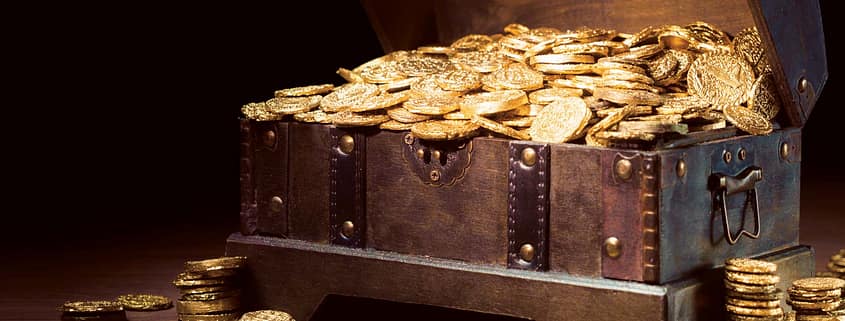You Stored Up Treasure
Exploring the Book of Ya’aqov, Pt. 22
[wbcr_php_snippet id=”11406″]
Go, now, you who are rich! Weep, howling over your miseries that are coming upon you! Your riches have rotted, and your garments have become moth-eaten. Your gold and silver have corroded, and the corrosion of them will be to you for a testimony, and will eat your flesh like fire. You stored up treasure for yourselves, as if we were not in the last days! Look! the wages of the workmen (…which had been fraudulently withheld by you) cry out…. You lived in luxury upon the earth, and were self-indulgent; you fed your hearts in a day of slaughter…. (יַעֲקֹב Ya’aqov 5:1-6, mjlt)
By now, it may be a laughable statistic: the “good old days,” when the U.S. national debt was only $25 trillion—of which the debt per tax payer was merely $200,000. This, of course, does not even seem real—it is literally unfathomable—given that the average American has enough trouble with his share of our collective personal debt (mortgages, credit cards and such) totaling $14 trillion. With such a heavy weight, then, it is understandable for us to see the accumulation of wealth as a way out—a rescue from a mounting and unsustainable deficit. But what if achieving financial security is not the answer? What if being rich is actually more risky than simply having enough?
It is difficult to convince a rich person that he is destitute. Indeed, even someone who lives in any amount of comfort will not honestly assess himself as impoverished, though he may still consider himself lacking. Yet the way we view and use our wealth can signify that we are actually quite bankrupt—and not because we are all out of money.
Though “a root of all the evils is the love of money” (1Ti. 6:10, mjlt), we do not become bereft through wealth simply as a consequence of having it. When we are rich (or comfortable), we continually look to have greater affluence (or more comfort), and to hold onto our wealth so that our standard of living might be increased—or at minimum, maintained. But this obsession for our provision today—even for tomorrow—is short-sighted, because, as we well know, riches do not last forever. We forget that while we seek to solve our seemingly unending problems with money, the solution of wealth is only temporary. The misery from riches, then, comes not from the wealth itself, but from our mistaken misperception of its enduring solvency.
We think that money holds its value and economies can’t collapse… but if they do, a bailout from thin air is just an electronic bank deposit away. Even for those who actually plan for the worst, sensing it is only a matter of time, gold and silver will yet corrode—their prudent preparedness notwithstanding. Obviously, money can and often does improve our lives, and both saving and being fiscally responsible are righteous deeds. But wealth becomes a problem because it becomes our god—we look to it as the source of our daily provision, and we trust in it for our ongoing protection, expecting it to take care of us. Such riches “have rotted” and “become moth-eaten”—they “will eat your flesh like fire.” A salvific approach to money—no matter how well-intended—is nothing short of worship… we have set it up in the place of God.
The more we look to wealth to rescue us, the more vulnerable we also become to the lure of luxury and self-indulgence. When our needs start being met, and we credit money for the relief, our eyes begin to wander from needs to wants—and soon we are fattening ourselves up for “a day of slaughter.” Even if we give a portion of it away, letting others benefit from our increase, as long as our undertone is one of self-preservation, we are acting “as if we were not in the last days,” placing our hope in a destructible store.
Did this post bless you?
♥
We demonstrate our spiritual bankruptcy by counting on money to rescue us from our circumstances, and finding financial security in our bottom line, rather than investing our faith in the eternal provision of Yeshua. When we feed our hearts with the confidence and comfort of money, it robs us of our reliance upon the only one that is truly imperishable. One day, all things will pass away, and any amount of wealth we accumulate will be made worthless. Don’t let the miseries of riches come upon you, but store up your trust in the treasure that truly lasts forever.
What do you think? Share your thoughts in the comments below!





Leave a Reply
Want to join the discussion?Feel free to contribute!